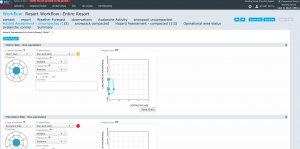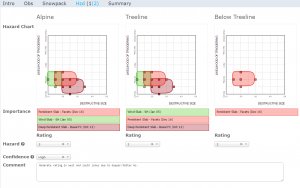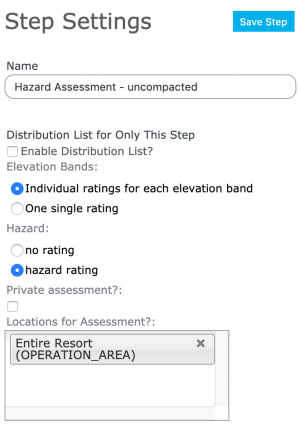Difference between revisions of "Hazard assessment module"
m (Pascal moved page Hazard assessment - detail module to Hazard assessment module) |
|||
| Line 1: | Line 1: | ||
__NOTOC__ | __NOTOC__ | ||
| − | {{Requirements|UserLevel= | + | {{Requirements|UserLevel=Submission moderator and higher|Connectivity=Online and partial offline}} |
| − | This document describes the | + | This document describes the functionality of the 'hazard assessment' workflow module and how to properly configure if for a workflow. |
| − | |||
| − | |||
| − | + | Required permissions: | |
| − | + | * You need to be a Operation administrator to create a [[Definitions#WorkflowTemplate|workflow template]]. | |
| − | + | * You need to be a Submission moderator to initiate a [[Definitions#WorkflowInstance|workflow instance]]. | |
| − | |||
| − | |||
| − | |||
| − | *You | ||
| − | |||
| − | |||
| + | ==Functionality== | ||
| + | The hazard assessment workflow module allows users to assessment avalanche hazard according to the '''conceptual model of avalanche hazard''' developed by Grant Statham and his colleagues. The hazard assessment process consists of two steps: | ||
| + | # Identifying the present avalanche problems and characterizing their condition using a hazard chart | ||
| + | # Assessing the overall hazard given the existing avalanche problems | ||
| − | |} | + | If you are not interested in the highly structured approach of the conceptual model of avalanche hazard, the [[Hazard comment module]] offers a low-tech alternative that allows you to enter a free-form description of the current avalanche problems and the resulting avalanche hazard. It is only possible to have either a single hazard assessment or a single hazard comment step in your workflow, not both. |
| + | |||
| + | The data entry fields of this workflow module are automatically pre-populated with the last snowpack and PWL information that was submitted to the InfoEx for the location(s) associated with the workflow. | ||
| + | {{Note|If you have multiple workflows for a location (e.g., AM and PM meetings), the information is pre-populated from the last time you submitted any workflow for the location. For example, in a regular rotation, the snowpack step in the PM meeting is pre-populated with information from the AM meeting and the next AM meeting is pre-populated with information from the PM meeting of the previous day.}} | ||
| + | |||
| + | Any workflow template with a hazard assessment module step will automatically have a [[Context module]] step added at the beginning of the workflow. | ||
| + | |||
| + | Any workflow template with a hazard assessment module step will automatically have a [[Workflow summary]] step added at the end of the workflow. This summary allows users to review their observations and assessments before they are submitted to the InfoEx. | ||
| + | |||
| + | The assessments submitted to the InfoEx via the hazard assessment module are associated with the location specified in the entry form of the individual observation. | ||
| + | |||
| + | It is possible to complete the hazard assessment step in a workflow without internet connectivity. | ||
| + | |||
| + | ==Layout== | ||
| + | [[File:HzdAssessmentModuleStep1.png|300px|thumb|right|Fig. 1: Hazard assessment workflow module step 1: Avalanche problems]] [[File:HzdAssessmentModuleStep2.png|300px|thumb|right|Fig. 2: Hazard assessment workflow module step 2: Avalanche hazard]] The hazard assessment workflow step consists of two steps: | ||
| + | |||
| + | ===Step 1: Avalanche problems=== | ||
| + | |||
| + | |||
| + | ===Step 2: Avalanche hazard=== | ||
| + | |||
| + | ==Settings== | ||
| + | [[File:HazardAssessmentPopup.png|300px|thumb|right|Fig. 3: Hazard assessment workflow module settings]] The hazard assessment workflow module has the following settings (Fig. 3): | ||
| + | |||
| + | * '''Name'''<br/>Name of the workflow step shown in the header of the workflow. It is recommended that you choose a short name (e.g., 'Av Hzd' instead of 'Avalanche Hazard') to keep the navigation bar of the workflow as tidy as possible. | ||
| + | |||
| + | ==Other workflow modules== | ||
| + | {{ListWorkflowModules|}} | ||
==Functionality tested by== | ==Functionality tested by== | ||
| − | * | + | * Dec. 28, 2013: Pascal Haegeli |
| − | [[Category:Workflows]] | + | [[Category:Super User]][[Category:Operation Administrator]][[Category:Submission Moderator]][[Category:Offline]][[Category:Workflows]][[Category:Version 3.4.0]] |
Revision as of 11:27, 28 December 2013
| REQUIREMENTS | |
| Permission | Submission moderator and higher |
| Connectivity | Online and partial offline |
This document describes the functionality of the 'hazard assessment' workflow module and how to properly configure if for a workflow.
Required permissions:
- You need to be a Operation administrator to create a workflow template.
- You need to be a Submission moderator to initiate a workflow instance.
Functionality
The hazard assessment workflow module allows users to assessment avalanche hazard according to the conceptual model of avalanche hazard developed by Grant Statham and his colleagues. The hazard assessment process consists of two steps:
- Identifying the present avalanche problems and characterizing their condition using a hazard chart
- Assessing the overall hazard given the existing avalanche problems
If you are not interested in the highly structured approach of the conceptual model of avalanche hazard, the Hazard comment module offers a low-tech alternative that allows you to enter a free-form description of the current avalanche problems and the resulting avalanche hazard. It is only possible to have either a single hazard assessment or a single hazard comment step in your workflow, not both.
The data entry fields of this workflow module are automatically pre-populated with the last snowpack and PWL information that was submitted to the InfoEx for the location(s) associated with the workflow.
| NOTE | If you have multiple workflows for a location (e.g., AM and PM meetings), the information is pre-populated from the last time you submitted any workflow for the location. For example, in a regular rotation, the snowpack step in the PM meeting is pre-populated with information from the AM meeting and the next AM meeting is pre-populated with information from the PM meeting of the previous day. |
Any workflow template with a hazard assessment module step will automatically have a Context module step added at the beginning of the workflow.
Any workflow template with a hazard assessment module step will automatically have a Workflow summary step added at the end of the workflow. This summary allows users to review their observations and assessments before they are submitted to the InfoEx.
The assessments submitted to the InfoEx via the hazard assessment module are associated with the location specified in the entry form of the individual observation.
It is possible to complete the hazard assessment step in a workflow without internet connectivity.
Layout
The hazard assessment workflow step consists of two steps:
Step 1: Avalanche problems
Step 2: Avalanche hazard
Settings
The hazard assessment workflow module has the following settings (Fig. 3):
- Name
Name of the workflow step shown in the header of the workflow. It is recommended that you choose a short name (e.g., 'Av Hzd' instead of 'Avalanche Hazard') to keep the navigation bar of the workflow as tidy as possible.
Other workflow modules
- Modules for entering data that is shared among InfoEx subscribers
- Modules for entering proprietary data
- Free form module
- Run list module (additional subscription required)
- Avalanche control module (additional subscription required)
- Modules for viewing information
- Other modules
Functionality tested by
- Dec. 28, 2013: Pascal Haegeli


